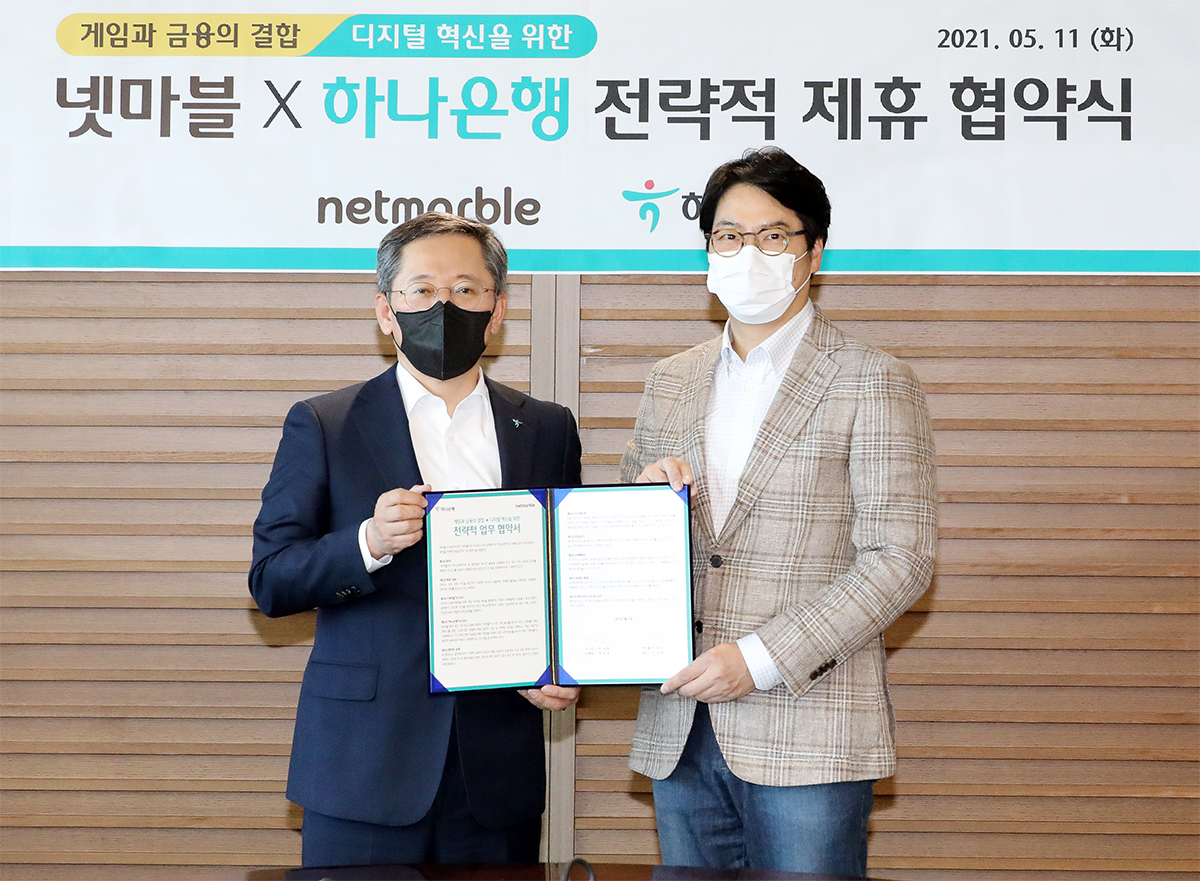
Cap-Hana Bank President Park Sung-ho and Netmarble co-CEO Lee Seung-won pose for a photo after signing a business agreement to jointly develop innovative digital financial services at the bank’s headquarters in Seoul, Tuesday. (Yonhap)
Cross-industry partnerships in the financial sector are in full swing as banks seek to transform personal data into a new revenue source, ditching their reliance on interest rates.
Commercial lenders and credit card companies have been rushing to forge alliances with mobile carriers and retailers to compile large volumes of customer data from business partners in order to provide personalized products and to fuel data-driven marketing activities.
The heating competition is ignited by the government-led MyData project aimed at ushering in a new era of data-led innovation in the financial sector, starting in August.
For banking and financial service firms that already face increasing challenges posed by Big Tech companies boasting a wealth of data collected from their platform users, obtaining a wide-ranging dataset is crucial to survival.
“The more datasets Mydata operators secure to analyze personal information and evaluate their creditworthiness, the better services tailored to customers’ needs they will be able to offer,” said Suh Jeong-ho, senior research fellow at Korea Institute of Finance.
So far, the state watchdog Financial Supervisory Service granted licenses to run MyData businesses to 28 companies including five local banks and fintech firms in January, with more companies expected to join the race later on.
By participating in the MyData program, licensed firms will provide consumers access to a comprehensive personal financial information from bank account balance to credit card payments and offer financial products tailored to customers based on analytics on their financial status and spending patterns.
As the Mydata service will be optimized for mobile devices, consumers will easily compare services and products provided by the operators and make quick decisions to switch to other firms, said Jung Yoo-shin, chief of Fintech Center Korea.
“The era has passed when financial firms can solve everything with their own capital, manpower and technology. … They have to push back the boundaries,” he said.
Shinhan Card teamed up with operators in various sectors, including mobile carrier SK Telecom, ratings agency Korea Credit Bureau, and GS Retail, which runs supermarkets, hotels and health and beauty businesses, as well as Budongsan 114, a real estate information provider.
For example, if Shinhan Card converges data sets provided by SK Telecom and GS Retail, they could generate an analysis of grocery shopping behavior of a consumer group that owns cars from the same brand.
Through this process of collecting, modeling, and analyzing data, the firms will be able to advance and personalize their marketing strategies and customer service.
To use the massive volumes of data, Shinhan Bank opted to find partners with a large number of customers.
Shinhan Bank launched a project with mobile carrier LG Uplus and CJ OliveNetworks, which operates OliveYoung, one of the country‘s leading beauty retailers, to tap into the new business opportunity. What they are aiming to do is offering micro-personalization of digital services by capitalizing on their combined number of customers, which stands at some 70 million.
“The data possessed by mobile carriers which includes as personal travel route, contents usage history and population density can greatly increase utilization when combined with financial data,” said an official at the bank.
Woori Bank joined hands with IT solution firm IBM Korea and the country’s largest telecommunication company KT for to develop digital financial products and identify new business areas using artificial intelligence. The three firms will work together for the AI business from the planning stage through to technology verification and operation.
Meanwhile, Hana Bank signed an agreement with mobile game developer Netmarble on Tuesday to target Millennial and Generation Z customers. Although the lender failed to win a MyData business license, it plans to develop content that combines gaming with finance to introduce new asset management service for the generations that are keen on digital and consumer-friendly products.
By Park Han-na (
hnpark@heraldcorp.com)






![[Graphic News] More Koreans say they plan long-distance trips this year](http://res.heraldm.com/phpwas/restmb_idxmake.php?idx=645&simg=/content/image/2024/04/17/20240417050828_0.gif&u=)